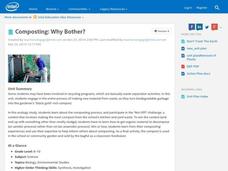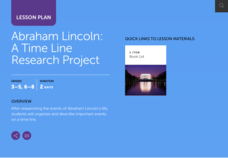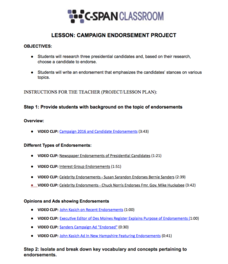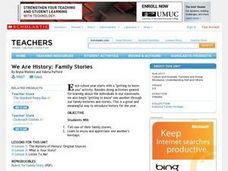National Endowment for the Humanities
The President Under the Articles of Confederation
The Articles of Confederation sounds like one big, fancy title to middle schoolers. Here, scaffolded steps help to ease novices into understanding this all-important American document. Discussion questions, lesson activities, and ideas...
Intel
Composting: Why Bother?
The first STEM lesson in a group of 10 explores composting. After discussing how to make a better tomorrow, classes are challenged to track garbage in their communities, visit a local waste management facility, and conduct a survey about...
Building Evidence-Based Arguments: Grade 9
New ReviewHigh schoolers investigate the dilemma of a proportional response with a lesson about the history of terrorism and militant extremists in the United States. As they examine memos from the FBI and speeches from President Bush and Obama,...
Core Knowledge Foundation
Unit 6: The Reformation
Over three weeks, fifth graders read about and discuss the Reformation which saw religion and politics shift across Europe. Following daily readings, young scholars practice spelling, grammar, and morphology skills such as prefixes,...
Curated OER
Biological Relationships
Create a written document to show knowledge of producers, consumers, decomposers, and symbiotic relationships. To investigate food consumption, your classes will differentiate between types of symbiosis and explain examples of each.
Scholastic
Abraham Lincoln: A Time Line Research Project
Though Abraham Lincoln's life was tragically cut short, it was filled with accomplishments and inspiring moments that continue to influence American democracy. Explore the ways the 16th president of the United States made his way from a...
Scholastic
Ready to Research Owls
Researching facts about owls can be a hoot for your class. Let them wisely collaborate on this writing project. The resource is the second part of three parts. It is best to use all three lessons in order.
C-SPAN
Campaign Endorsement Project
So many politicians, so many endorsements! Learn to differentiate between facts as well as the process of endorsements with an informative resource. Class members watch current endorsement videos, research candidates from three different...
Smithsonian Institution
The American Presidency: Grades 4-6
An interesting unit explains the American presidency from the campaign trail all the way to the role of the president. Historians participate in discussions, create posters, conduct Internet research, and more to gain an understanding of...
Curated OER
The True Confessions of Charlotte Doyle: KWHL
After completing the 11th chapter of The True Confessions of Charlotte Doyle by Avi, take part in a KWHL chart driven by the question,When is it appropriate and admirable to defy authority? Focusing on codes of conduct, scholars...
Center for History and New Media
The Impact of the Jim Crow Era on Education, 1877–1930s
Even though American slaves were officially emancipated in 1865, the effects of slavery perpetuated throughout the 19th and 20th centuries. Middle and high schoolers learn about the ways that discrimination and the Jim Crow laws...
Pace University
Jacksonian Democracy
Jacksonian Democracy ... a total success or a complete failure? Young academics examine Jacksonian Democracy, including the concept of the supremacy of the federal government and the forced relocation of Native Americans. Scholars...
Curated OER
Cell Structures
Students differentiate between a prokaryotic and eukaryotic cell and give examples of both types. They differentiate between a plant and animal cell. Students will be able to name features common to both as well as unique features of each.
Curated OER
A Simple Task Made Complex: Types of Sentences
Looking for a lesson about differing sentence types? Use this lesson on compound and complex sentences in your grammar unit. After composing simple, compound, complex and compound-complex sentences individually and as part of a group,...
Curated OER
Hula How?
Third graders start writing papers with much more regularity than they did in the previous grades. They are starting to differentiate between the styles of writing and know why each is important. This activity gives the them a chance to...
Curated OER
Lions and Tigers and Bears - Oh My!
Research animals and develop a non-fiction presentation. Students will complete research on a particular animal and determine the animal's characteristics as well as habitat before choosing a differentiated project to present using the...
EduGAINs
Go H2O! Investigating Residential Water Systems
Before your learners excuse themselves to get a drink at the water fountain, prompt them to think about where that water comes from. A middle school science instructional activity encourages groups to research their community's source of...
Intel
Insects: The Good, The Bad, The Ugly
What would the world be like with no insects? Ponder this question using a research-based STEM unit that encourages scholars to investigate insects from both a beneficial and hazardous perspective. They learn about insect behaviors,...
Intel
Starquest
Almost every ancient culture observed the stars and saw pictures in the patterns. Studying stars allowed them to guide travelers, determine when to plant crops, when to harvest food, and the stories surrounding the images include some of...
Curated OER
House Opposite
Students read the short story House Opposite to help them differentiate between the terms "religion" and "spirituality." Students make connections to situations of people who struggle between the two in the real world by creating a...
Curated OER
Let the Campaign Begin
Learners differentiate between positive and negative personal attributes and select a fictional character for nomination who personifies the qualities of a good leader. They use the Internet to learn about the election process and write...
Curated OER
Calling All Fruits And Vegetables!
Students differentiate between fruits and vegetables. They identify 20-25 common fruits and vegetables and utilize the Internet to gather and organize information about fruits and vegetables. Afterward, they create a new fruit and...
Curated OER
We Are History: Family Stories
Young scholars examine their own family heritage and share family stories with the class. They differentiate between primary and secondary sources, and bring in and write about three artifacts from their family. They conduct an...
Curated OER
Underground Railroad
Students explore the Underground Railroad. In this U.S. history and technology lesson, students research an assigned topic related to the Underground Railroad, such as "abolitionist," "conductor," or "station houses." Students design a...

























